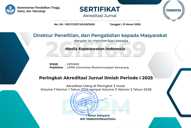Identifying psychosocial problems in children and adolescent with chronic illness to prevent psychosocial damage
(1) Magister Ilmu Keperawatan , Fakultas Ilmu Keperawatan, Universitas Indonesia RSUPN Dr. Cipto Mangunkusumo Jakarta
(2) Magister Ilmu Keperawatan , Fakultas Ilmu Keperawatan, Universitas Indonesia RS Universitas Indonesia
(3) Magister Ilmu Keperawatan , Fakultas Ilmu Keperawatan, Universitas Indonesia RSPI Prof Dr Sulianti Saroso Jakarta
(*) Corresponding Author
Abstract
Keywords
Full Text:
PDFReferences
Gürkan KP, Bahar Z, Çapık C, Aydoğdu NG, Beşer A. Psychometric properties of the Turkish version of the pediatric quality of life: The family impact module in parents of children with type 1 diabetes. Children’s Health Care 2020;49:87–99. https://doi.org/10.1080/02739615.2019.1570464.
Orth Z, van Wyk B. Measuring mental wellness among adolescents living with a physical chronic condition: a systematic review of the mental health and mental well-being instruments. BMC Psychology 2021;9:1–18. https://doi.org/10.1186/s40359-021-00680-w.
Faidah PN, Allenidekania A, Wanda D. Skills Based Interventions terhadap Psikososial Remaja dengan Penyakit Kronik. Journal of Telenursing (JOTING) 2023;5:352–62. https://doi.org/10.31539/joting.v5i1.5631.
Papp ZK, Török S, Szentes A, Hosszú D, Kökönyei G. Parent-child agreement on health-related quality of life: the role of perceived consequences of the child’s chronic illness. Psychology and Health 2024;39:233–51. https://doi.org/10.1080/08870446.2022.2057496.
Anderson JR, Killian M, Fuller A, Hughes JL, Byerly M, Lindow J, et al. Psychometric Evaluation of the Pediatric Quality of Life Enjoyment and Satisfaction Questionnaire in a General Youth Population. Child Psychiatry and Human Development 2022;53:546–53. https://doi.org/10.1007/s10578-021-01148-z.
Sastroasmoro S, Ismail S. Dasar-Dasar Metodologi Penelitan Klinis. 5th ed. Jakarta: CV Sagung Seto; 2014.
Afiyanti Y, Rachmawati I. Metodologi Penelitian Kualitatif Dalam Riset Keperawatan. 2nd ed. Depok Jawa Barat: 2022.
Abassi H, Huguet H, Picot MC, Vincenti M, Guillaumont S, Auer A, et al. Health-related quality of life in children with congenital heart disease aged 5 to 7 years: a multicentre controlled cross-sectional study. Health and Quality of Life Outcomes 2020;18:1–15. https://doi.org/10.1186/s12955-020-01615-6.
Ferraz A, Santos M, Pereira MG. Portuguese Validation of the TAPQoL: A Health-Related Quality of Life Instrument for Children Aged 0–6 Years. European Journal of Investigation in Health, Psychology and Education 2024;14:399–410. https://doi.org/10.3390/ejihpe14020027.
Bakar KA, Asiah MN, Alwi SM, Syaniza S, Sangeet S, Li YS, et al. Health-related quality of life amongst children with chronic kidney disease in Malaysia : performance of the bahasa melayu version od the PedsQL 3.0 ESRD Module. Pediatric Nephrology 2023;38:1897–905.
Hsu CN, Tain YL, Lu PC, Lin HW. Comparisons of EQ-5D-Y and PedsQL in pediatric patients with mild-to-moderate chronic kidney disease in longitudinal analyses. Health and Quality of Life Outcomes 2023;21. https://doi.org/10.1186/s12955-023-02197-9.
Garcia – Martinez de Bartolomé R, Barrio-Torres J, Cilleruelo- Pascual MlL, Rodríguez-Soler JJ, Gil-de Miguel Á, Sebastián-Viana T. Psychometric evaluation of the Spanish version of the Pediatric Quality of Life Eosinophilic Esophagitis Questionnaire (Peds QL-EoE Module TM). Health and Quality of Life Outcomes 2023;21:1–14. https://doi.org/10.1186/s12955-023-02211-0.
Parker EM, Jacobson J, Pullmann MD, Kerns SEU. Identifying Psychosocial Problems Among Children and Youth in the Child Welfare System Using the PSC-17: Exploring Convergent and Discriminant Validity with Multiple Informants. Child Psychiatry and Human Development 2019;50:108–20. https://doi.org/10.1007/s10578-018-0824-6.
Wang Y, Clemens JL, Muriello M, Mu W, Smith CH, Tran PT, et al. Agreement between parent-proxy and child self-report in pediatric hypermobile Ehlers-Danlos syndrome. Journal of Child Health Care 2024;28:316–28. https://doi.org/10.1177/13674935221110081.
Düken ME, Yayan EH. Psychosocial conditions of children after liver transplant: Post-traumatic stress, depression, and anxiety. Journal of Pediatric Nursing 2024;75:e75–80. https://doi.org/10.1016/j.pedn.2023.12.033.
Article Metrics
Abstract view : 58 timesPDF - 0 times
DOI: https://doi.org/10.26714/mki.8.2.2025.159-169
Refbacks
- There are currently no refbacks.
Copyright (c) 2025 Risna Ningsih, Ina Islamia, Atika Rahmawani

This work is licensed under a Creative Commons Attribution 4.0 International License.
This journal is indexed by:
Kedungmundu Raya No. 18 Semarang NRC Building Universitas Muhammadiyah Semarang
Phone: 02476740287
Fax: 02476740287
Email: mki@unimus.ac.id





















